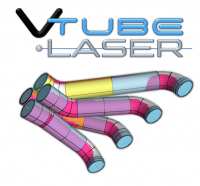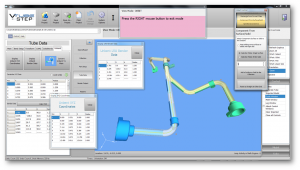Measuring Coping
|
This article discusses how to measure a coping along with the tube shape in VTube-LASER. The method is to find a way to measure the coping as if it were an additional straight on the end of the tube.
In order to do this, the pipe straight that joins the main pipe at the coping can be treated like and extra end-straight on the pipe in VTube-LASER
STEP 1: Design a Coping Adapter in a Solid Modelling Program
|
In this example, we designed an adapter in SOLIDWORKS that simulates the joining pipe to the main pipe. |
|
STEP 2: Import the Model with the Adapter into VTube-STEP
|
VTube-STEP is included as one of the modes with every VTube-LASER. Switch to STEP mode, then clear the project, then import the STEP model created in the solid modelling program. |
|
Other Pages
- Back to the VTube-STEP page
- Back to the VTube-LASER page




